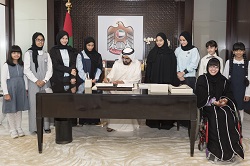Media Center
Sheikh Khalifa issues National Law of Reading
In an unprecedented, civilised and legislative gesture for the region, President His Highness Sheikh Khalifa Bin Zayed Al Nahyan issued the first-ever National Law of Reading, that sets legislative frameworks, executive programmes and specific government responsibilities to establish the value of reading in the UAE. The law aims to support human resources development and contribute to building mental and cognitive capabilities, while support national intellectual production and build knowledge-based societies in the country. The law will institutionalise all efforts to enhance reading in the community, said Sheikh Khalifa, while confirming that it aims to invest in humans and establish the UAE's image as an inspirational model in the region. The law aims to make learning a lifelong process for all segments of the society and promote the intellectual and cultural assets for the UAE’s citizens, the president pointed out. Reading and knowledge are the real foundations for genuine development and concerted efforts should be made to ensure the success of this law, he added. "Our goal is to prepare generations which work towards excelling and achieving the vision of the UAE, which since its inception, has recognised the importance of knowledge, science and culture, and harnessed them in the best interests of the homeland and the Emiratis," Sheikh Khalifa said. While expressing his pride at the law, Vice President, Prime Minister and Ruler of Dubai His Highness Sheikh Mohammed Bin Rashid Al Maktoum said, "The law has the same cultural value as reading, and transforms it to an integrated government project." He also celebrated the imposition of the law at his office in Emirates Towers in the presence of a number of winners of the Arabic Reading Challenge in the UAE. "While drafting the law, we depended on international legal experiences bearing in mind that its articles would reflect our local heritage and Arab identity," Sheikh Mohammed said. Sheikh Mohammed emphasised that reading is the right of all members of society and guaranteed by law since early childhood. The law, the first legislation of its kind, obliges the government to intervene early to enhance reading through provision of a knowledge bag for new-borns and children, he added. "We seek to promote reading and knowledge in schools, universities, foundations, homes and across the state," he noted. "Our goal is to make reading a daily habit for the people and competent institutions should translate the law into reality," he also indicated. The law acquires exceptional importance as a comprehensive law on the national level. It highlights the country and its leadership's interest in human development, and to develop the cultural assets of its citizens in order to prepare and rehabilitate well educated generations that are able to establish intellectual Emirati legacy, which would enable the country to occupy a prominent position among the economies of knowledge-based countries.
The law also covers all issues relating to the development of reading and publishing to ensure continuity of reading and the cultural effort taken to institutionalise public efforts.
The law seeks to instil reading as a daily activity in public utilities in the country such as coffee shops and malls and asks them to provide reading material to visitors. It also instils the importance of books among students to preserve and not destroy, re-use or donate them. The law also develops the educational system so it is not separate from educational reading by obliging schools and universities to develop their libraries and encourage reading among students through annual plans. The federal law decree issued by President His Highness Sheikh Khalifa bin Zayed Al Nahyan includes 18 articles. According to the law, the Ministry of Economy and other competent departments will ask coffee shops in the malls to provide reading materials to cope with the number of customers and engage their attention. The law focuses on the need of full integration between the educational system and reading. It urges the Ministry of Education and other competent departments in the education sector to develop curricula and educational systems to promote reading skills among students and to oblige private educational institutions to develop their curricula to enable students to enhance their language capabilities. According to the law, other competent authorities are asked to provide public libraries or reading facilities across the country, and stimulate private sector to invest in building libraries and cultural centres. The law also stipulates that the Ministry of Culture and Knowledge Development will establish a unified and comprehensive database for all libraries in addition to libraries of the government institutions. The law states that the National Media Council, the Ministry of Culture and Knowledge Development and Ministry of the Economy will set the development programmes to promote publication industry in the country and issue policies that would enhance reading in Arabic Language and provide high quality national books. It also states that Ministry of Culture and Knowledge Development will set the plans and the necessary fund to support publishing of materials and distribute them in accordance with the needs of the people with special needs.


